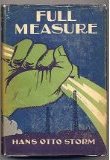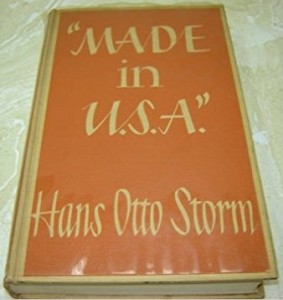 Hans Otto Storm (1895–1941) was a German-American writer, novelist and radio engineer. His reputation quickly faded into obscurity after his early death, but in the 1940s received some positive praise from the legendary literary critic Edmund Wilson. Storm also holds the distinction of being the first person in the U.S. to die in WWII.
Hans Otto Storm (1895–1941) was a German-American writer, novelist and radio engineer. His reputation quickly faded into obscurity after his early death, but in the 1940s received some positive praise from the legendary literary critic Edmund Wilson. Storm also holds the distinction of being the first person in the U.S. to die in WWII.
Storm was born in Bloomington, CA, to German parents who were refugees fleeing anti-socialist fervor in Germany following the failed Revolutions of 1848. His family made their way to Anaheim, taking up residence at 907 W. Broadway, one block north of Anaheim Union High School.
Storm graduated from AUHS in 1913. His senior quote in the school’s annual was certainly a self-fulfilling prophecy: “Fire in each eye, and papers in each hand, he raves, recites and maddens round the land.”
A top scholar, Storm studied engineering at Stanford University while supporting himself in the electrician’s trade. His education was interrupted in 1917 when the U.S. entered WWI and Storm was drafted into the Army. A biography on his life in Twentieth Century Authors states that he contracted various illnesses and was held two years in various hospitals as a patient and attendant.
Storm earned his bachelor’s from Stanford in 1920, and as a radio-telegraph engineer with Globe Wireless of San Francisco, he constructed radio stations in New York, Nicaragua and Peru.
His experience in South and Central America resulted in Pity the Poor Tyrant (1937). The novel about an American engineer who becomes involved in a Peruvian revolution is considered his best work. The book made his reputation but so enraged Peruvian authorities that he was order out of the country in 1939 when he was there to install a communication system for the international “Good Neighbor” Conference in Lima.
Storm worked full time at his profession and was frequently ill, but still managed to write four novels, short stories, poems, plays, essays and articles. A collection of his works is housed at Berkeley’s Bancroft Library.
 His first novel, Full Measure (1929), a book about industrial expansion strongest on the subject of radio engineering and its equipment, received mildly positive reviews but sold little over a 1,000 copies.
His first novel, Full Measure (1929), a book about industrial expansion strongest on the subject of radio engineering and its equipment, received mildly positive reviews but sold little over a 1,000 copies.
His third novel, Made in the USA (1939), is a “social fable” about a tramp steamer full of passengers that becomes stuck on a sand-bar in the South Pacific. Civilized behavior deteriorates and the passengers break into two warring camps. 
In the forward of “Of Good Family,” a collection of Storm’s writings on Spanish America published in 1948, he is described by editor David Greenhood as “an astonishing and brilliant man . . . one of our finest engineers” and “the author of some of the most penetrating novels and prose about Spanish America ever written by a North American.”
A curious combination of artist and practical scientist, Storm was described as possessing
“a dry wit and bubbling humor that didn’t often emerge in print.” He is reported to have said that he disliked “meetings, folding chairs and mimeographed leaflets.” A man who studied Chinese for fun, Storm built a boat in the backyard of his home in Palo Alto, where he lived with his wife Grace Cleone Camp. The couple sailed the boat along the Pacific Coast.
Storm met an untimely death when, on Dec. 11, 1941, three days after Congress declared war on Japan, he was accidentally electrocuted while rushing to complete a giant radio transformer for the Army Signal Corps in a laboratory in San Francisco.




